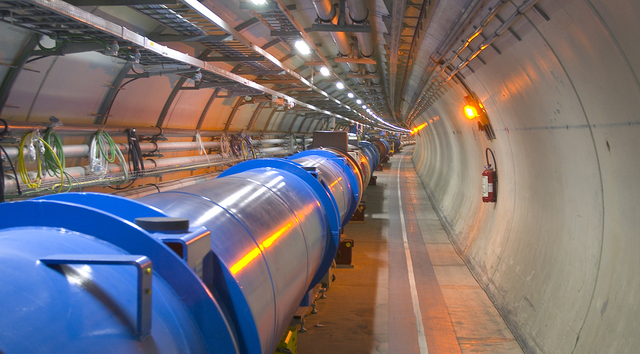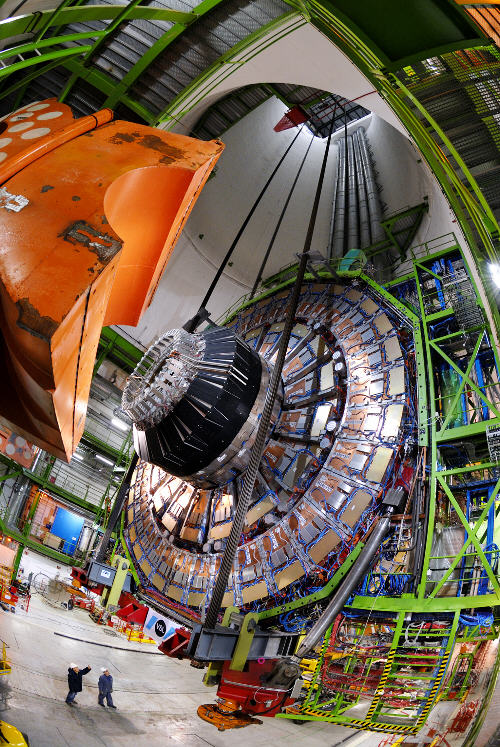How to Use the LHC

Chances are you have heard about the Large Hadron Collider, perhaps because you've read
Dan Browns book, or you've seen the idiots who are afraid of black holes in the news. Or, if you're
really cool, you know what it's really about because you read some media that actually report some
facts about it (i'm not sure these exist outside the science communtiy, though...).
for this instructable i am going to have to assume the latter case.
While not entirely tounge-in-cheek, "How to use the LHC" is quite involved and cannot be finished
in one afternoon just using common household material, like most instructables. Rather, years and
years of tedious work are required, but other than that, you don't really need anything. a laptop helps
but chances are you've got that already...
We will have to require that you have a high school degree or equivalent that let's you enter
universities in your country - or, if your country does not have universities - you need a degree
that lets you study elsewhere.
Dan Browns book, or you've seen the idiots who are afraid of black holes in the news. Or, if you're
really cool, you know what it's really about because you read some media that actually report some
facts about it (i'm not sure these exist outside the science communtiy, though...).
for this instructable i am going to have to assume the latter case.
While not entirely tounge-in-cheek, "How to use the LHC" is quite involved and cannot be finished
in one afternoon just using common household material, like most instructables. Rather, years and
years of tedious work are required, but other than that, you don't really need anything. a laptop helps
but chances are you've got that already...
We will have to require that you have a high school degree or equivalent that let's you enter
universities in your country - or, if your country does not have universities - you need a degree
that lets you study elsewhere.
Find Out What's Up With LHC



LHC is run at CERN, in Geneva, Switzerland, built across the border to France.
Read the public stuff at their website: www.cern.ch
Or get down with alpinekat: http://www.youtube.com/watch?v=j50ZssEojtM
However, to a certain extend CERN is just a service provider, building, running and maintaining the LHC.
In order to really use it i.e. check out what happens in the proton-proton collisions produced by it,
what you need to do is join one of the experiments.
So, on the CERN website click on "Cern Users" to get to the real content.
There you will find a list of experiments.
Let's ignore the smaller ones for now and have a look at the big f*ckers: ATLAS and CMS:
http://atlas.ch/
http://cms.cern.ch/
i put their propagand pictures above.
have look at their webpages and pick one.
if you really think size matters, ATLAS is your choice.
Read the public stuff at their website: www.cern.ch
Or get down with alpinekat: http://www.youtube.com/watch?v=j50ZssEojtM
However, to a certain extend CERN is just a service provider, building, running and maintaining the LHC.
In order to really use it i.e. check out what happens in the proton-proton collisions produced by it,
what you need to do is join one of the experiments.
So, on the CERN website click on "Cern Users" to get to the real content.
There you will find a list of experiments.
Let's ignore the smaller ones for now and have a look at the big f*ckers: ATLAS and CMS:
http://atlas.ch/
http://cms.cern.ch/
i put their propagand pictures above.
have look at their webpages and pick one.
if you really think size matters, ATLAS is your choice.
Find a Participating University

Next you'll need to find a university that is participating in one of the experiments.
You can find lists in CERN's greybook:
http://greybook.cern.ch/programmes/experiments/ATLAS_details.html
http://greybook.cern.ch/programmes/experiments/CMS_details.html
please, do not contact any of the people listed there at this stage!
first, see to it that you can study physics at one of the universities listed.
If you're not from one of the many participating countries, do not despair.
just start studying physics for now, and later get to one of the participating
university via some transfer program. i've seen particle physicists come from
the most unlikely of places.
You can find lists in CERN's greybook:
http://greybook.cern.ch/programmes/experiments/ATLAS_details.html
http://greybook.cern.ch/programmes/experiments/CMS_details.html
please, do not contact any of the people listed there at this stage!
first, see to it that you can study physics at one of the universities listed.
If you're not from one of the many participating countries, do not despair.
just start studying physics for now, and later get to one of the participating
university via some transfer program. i've seen particle physicists come from
the most unlikely of places.
Study Physics
Sit on your ass for several years and work your way through all those books,
do all those excercises, pass all those exams, do all that lab work. understand
general, basic physics at first. Don't forget to party hard with your fellow students,
if student culture in your country allows it. If you're older because you only found
this instructable after you already picked a profession,
you may want to skip that to speed things up a little.
as soon as it comes to specialising pick the particle physics courses.
there are three general methods of operation in particle physics:
- theory. you want a good basis, but if you're becoming a theorist you won't be using the LHC
directly. so for the purpose of this instructable, you don't want to do that.
- detectors. the detectors are pretty much finished at this time, so all you want is a basic
working knowledge, and be prepared to help running a detector.
for the purpose of this instructable, you don't want to engage in detector development.
- experimental. this is the way to go. visit as many courses as you can. once you do, you're
almost there.
at the same time, if it is not foreseen in the curriculum of your university anyway,
try to get good language and computing skills. A good mastery of English is mandatory.
French is also handy because the technicians, admisitrative assistants at CERN and the
general population around CERN speak it. It is not absolutely mandatory, but helps a lot,
for example if you need a chair in your office (once you managed to get one, see later steps).
and you can't have too many computing skills because particle physics is anarchy to a certain
extend and you will have to work with all sorts of programming languages because everybody
just uses what they like in the end. C++ is most important. OS is almost exclusively Linux these days.
(sorry, no images for this step ... couldn't find any safe for work)
do all those excercises, pass all those exams, do all that lab work. understand
general, basic physics at first. Don't forget to party hard with your fellow students,
if student culture in your country allows it. If you're older because you only found
this instructable after you already picked a profession,
you may want to skip that to speed things up a little.
as soon as it comes to specialising pick the particle physics courses.
there are three general methods of operation in particle physics:
- theory. you want a good basis, but if you're becoming a theorist you won't be using the LHC
directly. so for the purpose of this instructable, you don't want to do that.
- detectors. the detectors are pretty much finished at this time, so all you want is a basic
working knowledge, and be prepared to help running a detector.
for the purpose of this instructable, you don't want to engage in detector development.
- experimental. this is the way to go. visit as many courses as you can. once you do, you're
almost there.
at the same time, if it is not foreseen in the curriculum of your university anyway,
try to get good language and computing skills. A good mastery of English is mandatory.
French is also handy because the technicians, admisitrative assistants at CERN and the
general population around CERN speak it. It is not absolutely mandatory, but helps a lot,
for example if you need a chair in your office (once you managed to get one, see later steps).
and you can't have too many computing skills because particle physics is anarchy to a certain
extend and you will have to work with all sorts of programming languages because everybody
just uses what they like in the end. C++ is most important. OS is almost exclusively Linux these days.
(sorry, no images for this step ... couldn't find any safe for work)
Write a Thesis

You're almost there. If your university foresees you to do a Masters degree, you will have to work
with a research group to write a thesis. Contact the one you targeted in Step 2.
Convince them they need you. Choose a topic. Tell them, if possible you want use real data.
And convince them that you have to work at CERN, because you know French and because
you are ready to help run the detectors they built earlier.
That's it, you're using the LHC.
If you did everything correctly, you will produce images like the one above, called event displays.
They show tracks and energy depositions from "events" (collisons) produced at the LHC.
Now the tricky part is to stay, but that's beyond the scope of this instructable.
with a research group to write a thesis. Contact the one you targeted in Step 2.
Convince them they need you. Choose a topic. Tell them, if possible you want use real data.
And convince them that you have to work at CERN, because you know French and because
you are ready to help run the detectors they built earlier.
That's it, you're using the LHC.
If you did everything correctly, you will produce images like the one above, called event displays.
They show tracks and energy depositions from "events" (collisons) produced at the LHC.
Now the tricky part is to stay, but that's beyond the scope of this instructable.